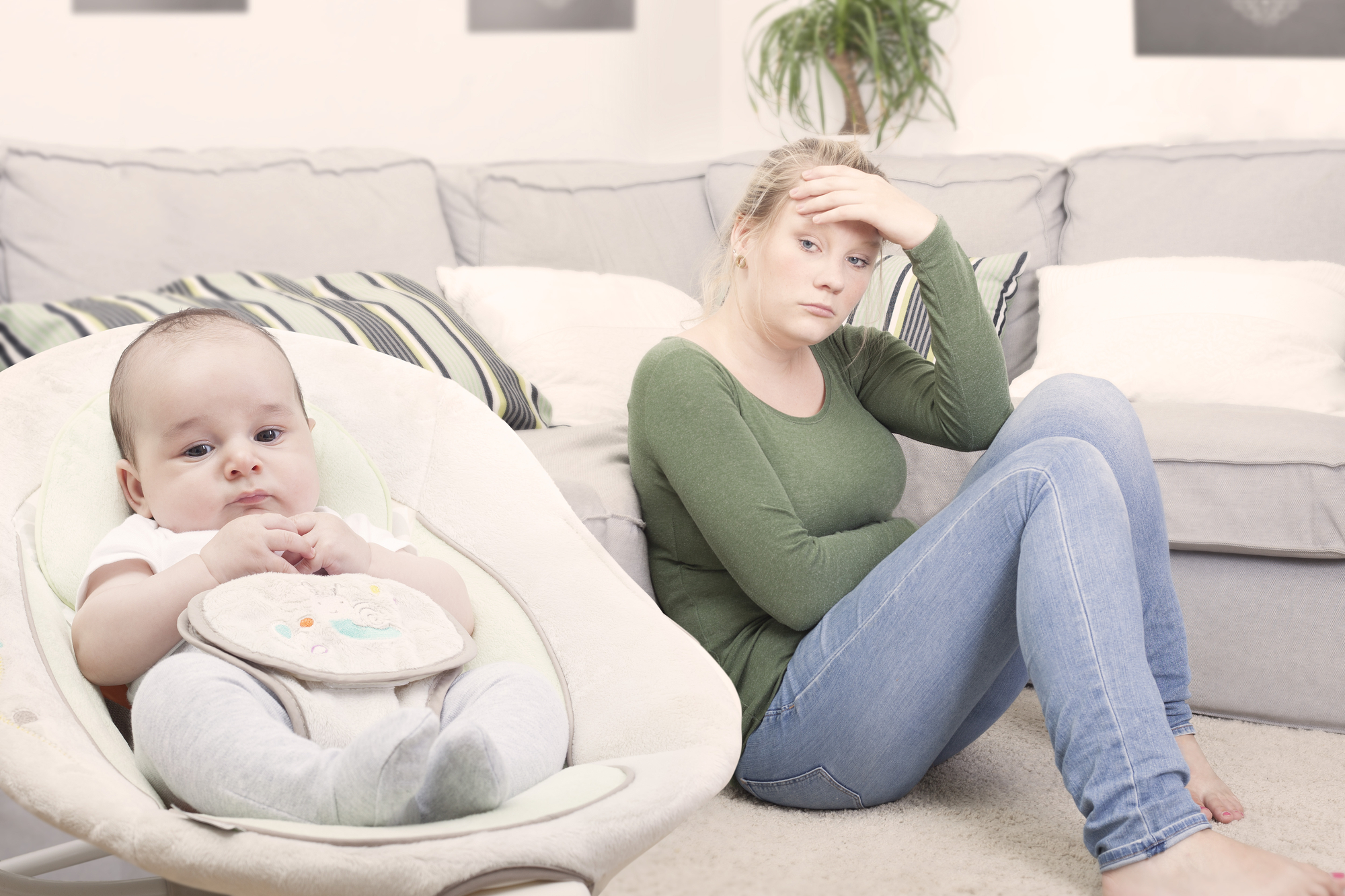On the floor sits the mum who is feeling constantly sad and cries for no reason. She’s always tired and has no energy, even when her baby is sleeping well. She’s lost interest in the things that used to make her happy. She’s easily annoyed and doesn’t want to see her friends and family. She sometimes feels constantly worried or panicky. She may even have thoughts about harming her baby or herself. This is the mother who may have perinatal anxiety and depression.
Perinatal anxiety or depression (PND) occurs during pregnancy and in the first year after birth. For some mums it only impacts their lives a little bit, for others it is severe and devastating.
PND is a treatable condition that mums can recover from. However, for the over 100,000 mums in Australia who suffer each year, many are reluctant to seek help.
Why is the mum who is worried that she is not feeling happy, not connected to her child or is always sad, crying, worried and not able to function, not seeking help? Because she often feels that these symptoms mean that she is not a good enough mother and something is fundamentally wrong with her. Nothing could be further from the truth!
Too many still believe in the idea of the self-sacrificial mother; the mother who has to be perfect, do everything and have it all together. With 1 in 5 mothers experiencing negative feelings about being a mum, persistent low moods and not enjoying parenting, the numbers show that lots of us don’t have it all together. And that is perfectly okay!
Despite conversations about mental health becoming more frequent and public, there is still significant stigma about admitting that you are struggling and need to seek help. Mothers are not immune from this stigma.
The primary stigma associated with PND is that a mum who is diagnosed and receives treatment, is a bad mum. Because this stigma exists when a mum experiences symptoms and is worried that she has PND, she often feels ashamed and as if she is not good enough.
This shame spirals and mums worry that they may be labelled a “bad mum” and worried about what others may think of them if they talk about how they are feeling. Mums may worry that accepting medication will impact their pregnancy, prevent them from breastfeeding or that they may not be alert enough to look after their child. When all these worries exist, mums are less likely to seek help.
I suffered PND with each of my three my children, with my second experience being very severe. I have seen psychologists, done group therapy and taken medication. Each time I have recovered. My recovery from PND after the birth of my second baby inspired me to create my parenting support service, Blissed Out Mums. Working with Kiddipedia, I want to provide you four steps that you can take to help overcome feelings of shame around experiencing PND and help you seek the support that you need.
-
Don’t Isolate
The hardest thing when you think you may have PND or after you have been diagnosed, is the feeling of being alone. Thanks to the beauty of social media, every mum can connect with supportive resources, even before being diagnosed. On Instagram (at the time of writing) the hashtag #postnataldepression has 84.6 thousand posts. On Facebook the same search provides a network of awareness, support pages and groups.
Connecting with any of these resources can be an excellent first step for a mum who may think or know that she has PND. They help us know that what we are feeling is normal, does not mean we are bad mum, and that there is nothing to be ashamed of.
-
Reframe Seeking Help
The thought that seeking help for PND means that a mother will be judged and labelled as a “bad mum” is a major barrier to getting treatment. In reality, no reputable professional or organisation who supports mothers and families will judge a mother for how she is feeling.
Reframing seeking help from a negative thing to something that is positive, is a key step to motivating us to seek support and treatment, especially if we’re not in the habit of looking after ourselves.
Seeking help benefits us and our child. It is not a selfish act. It is an ultimate act of love. A mother cannot look after her child if she is not well and does not look after herself, physically and mentally.
-
Use Affirmations
Shame is an emotion that comes about because of the beliefs we have. Beliefs are created by the thoughts that we think repeatedly on a day-to-day basis. A mum who feels shame about experiencing PND is often thinking that she is a bad mum, that she isn’t good enough, that she is a failure. These thoughts start slowly, compound and become the fuel for PND symptoms.
Challenging these thoughts and changing the way we think isn’t easy. We often feel silly at first and don’t believe the new thoughts, but changing the we way think is a key part of overcoming the shame of having PND.
The simplest affirmation I recommend to my clients is “I love and accept myself exactly as I am”.
This simple phrase is life changing, and it was a key part of my own recovery from PND. Self-love and self-acceptance defeat shame and can give us the courage to seek help when we are scared to.
-
Seek Treatment
The hardest and also the most effective way to conquer shame around PND is to seek treatment. When we talk to professionals it helps normalises our symptoms and reinforces how having PND does not mean that we are a bad mum. Participating in talk therapy, group programs or, if recommended, taking medication reduces our symptoms, increases feelings of wellbeing and starts the journey on the road to recovery. Once we’re on that journey, and surrounded by support, our feelings of shame become less and less intense.
In Australia, any mum can go to their GP and access a number of psychology appointments under Medicare. Blissed Out Mums provides specialised support programs for mothers who experience PND. All the information can be found through my website and you can get in contact with me if you need to talk. Other Australian organisations that support mothers include The Gidget Foundation and PANDA.
Perinatal depression is not uncommon. 1 in 5 mums are diagnosed with this treatable condition. Shame is a toxic feeling and prevents mums seeking the help that they desperately need. Taking steps to reduce the feeling of shame while loving and accepting ourselves helps us heal. What is good for us, is good for our child and good for our family.
You are not alone. No mum deserves to experience PND in silence. Have the courage to talk about how you are feeling. I promise yours non-judgemental support is out there and recovery is possible.

Hi! I’m Heather and I run Blissed Out Mums. I know what it’s like to find motherhood so overwhelming that you want to scream and run away. But that doesn’t help anyone, especially if you want the best for your kids. Looking after yourself means looking after your kids. In a judgement free zone, let me help you be happier, laugh more and play more.
To view on YouTube:
You may also like to read:








